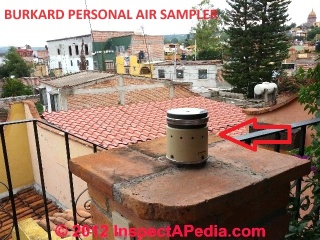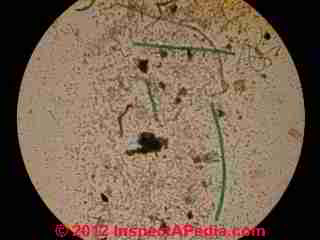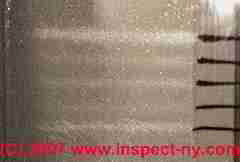 Airborne Particle Count Number Guide
Airborne Particle Count Number Guide
What is the Acceptable Level of Airborne Particles, including Mold, Pollen, & Other Dust Particles in Buildings?
- POST a QUESTION or COMMENT about this article topic.
Airborne particle count report interpretation.
This article discusses the possible significance of different levels of indoor airborne particles - counts and test reports for the main categories of indoor particles likely to be found in air.
The photo just above illustrates using a Burkhard personal air sampler or PAS for sampling for outdoor airborne particle levels during
an AIR QUALITY STUDY San Miguel de Allende where we found high levels of non-fungal granular debris, principally soil dust.
InspectAPedia tolerates no conflicts of interest. We have no relationship with advertisers, products, or services discussed at this website.
- Daniel Friedman, Publisher/Editor/Author - See WHO ARE WE?
Building Air Contamination Levels: What are Acceptable Particle Count Levels in Buildings
Here we provide a table of airborne particle counts vs. possible indoor air hazard thresholds for common particle types including animal dander, cellulose or fabric fibers, fiberglass, mold spores, pollen grains, and opaque particles that may be road dust or other inorganic or organic particles.
Photo: a rather fuzzy photo of a microscope slide showing part of a particle trace from an airborne particle sampler. Notice the wide range of particle shapes and sizes, from large fabric fibers and soot particles to much smaller particles yet to be focused upon.
[Click to enlarge any image]
For each particle type, we give a problem threshold level in counts per cubic meter, we describe the common causes of high particle levels, and we refer readers to more in-depth information for each particle type.
Airborne Particle Counts Indicating Possible IAQ Problems |
|||
| Contaminant | Level cts/M3 |
Common Causes |
Comment |
| Animal Dander | > 10,000 | High human/animal occupancy Inadequate fresh air ventilation Poor HVAC filtration Poor housekeeping |
|
Cellulose or Fabric Fibers |
> 1000 | High human occupancy High paper/fabric handling Poor housekeeping |
|
| Fiberglass | > 100 | Ceiling tiles disturbed Renovation/demolition Insulation shedding |
FIBERGLASS FIBERGLASS HAZARDS - home |
| Mold Spores | <1000 = typical background 1000-5000 = high >5000 = active indoor growth >10,000 = contamination |
Trapped moisture or History of leaks or Flooding or Inadequate remediation |
|
| Pollen Grains | > 20 | Poor HVAC filtration High outdoor air infiltration Poor housekeeping |
|
| Opaque Particles |
>5000 | High outdoor air infiltration Near active roadway Non-fungal granular Insulation shedding Soot or Copier Toner Poor housekeeping |
|
Notes to the table above
- The table above is considering particle type and airborne concentration, not individual particle size. For example, problem mold spores can be as small as 1u while typically pollen grains are 10 to 50 x larger.
Such studies also don't alone address differences in particle mass nor shape. Heavier particles tend to fall out of air more quickly than smaller lighter particles, and the smallest particles might remain airborne for many hours, kept aloft even by simple thermal convection air currents.
Separately, common generic airborne particle studies focus on particles designated as pm 2.5 - that is, particles in the 2.5 micron size range.
See details at AIRBORNE PARTICLE SIZE DEFINITIONS & TYPES
and at PARTICLES in INDOOR AIR, CHART
- Airborne particle levels at or above the general opinions and guidance in this table do not necessarily cause adverse health complaints or effects. Individual sensitivity to airborne contaminants and variations in building ventilation, air movement and other factors can have very significant effect on IAQ complaints.
- See also HVAC DUST CONTAMINATION STUDY
- Pai, Sidhant J., Therese S. Carter, Colette L. Heald, and Jesse H. Kroll. UPDATED WORLD HEALTH ORGANIZATION AIR QUALITY GUIDELINES HIGHLIGHT THE IMPORTANCE OF NON-ANTHROPOGENIC PM2.5 PDF] Environmental Science & Technology Letters 9, no. 6 (2022): 501-506.
The World Health Organization recently updated their air quality guideline for annual fine particulate matter (PM2.5) exposure from 10 to 5 μg m−3 , citing global health considerations. We explore if this guideline is attainable across different regions of the world using a series of model sensitivity simulations for 2019.
Our results indicate that >90% of the global population is exposed to PM2.5 concentrations that exceed the 5 μg m−3 guideline and that only a few sparsely populated regions (largely in boreal North America and Asia) experience annual average concentrations of <5 μg m−3 .
We find that even under an extreme abatement scenario, with no anthropogenic emissions, more than half of the world’s population would still experience annual PM2.5 exposures above the 5 μg m−3 guideline (including >70% and >60% of the African and Asian populations, respectively), largely due to fires and natural dust.
Our simulations demonstrate the large heterogeneity in PM2.5 composition across different regions and highlight how PM2.5 composition is sensitive to reductions in anthropogenic emissions.
We thus suggest the use of speciated aerosol exposure guidelines to help facilitate region-specific air quality management decisions and improve health-burden estimates of fine aerosol exposure. KEYWORDS: PM2.5, aerosols, exposure, WHO guideline, composition, health, PM2.5 mortality
Above:
The variation in thickness of these air sampler particle traces, collected in a single location using an Allergenco sampling machine and using the same collection interval, demonstrate how small changes such as waving a notebook or walking across a carpet can make such a huge difference in airborne particle levels.
One can see the differences even in macro or gross from just looking at the density and width of the particle trace.
This sort of experiment is why we say that we find 3-4 orders of magnitude variation in airborne particle counts in the same location when there are even small changes in test conditions.
...
...
Continue reading at AIRBORNE PARTICLE COUNT VARIATION CAUSES or select a topic from the closely-related articles below, or see the complete ARTICLE INDEX.
Or see these
Recommended Articles
- AIR POLLUTANTS, COMMON INDOOR
- AIRBORNE PARTICLE TEST SAMPLING CASSETTE STUDY
- AIRBORNE MOLD SPORE COUNT GUIDE - home
- AIRBORNE PARTICLE LEVELS vs IAQ - home
- AIRBORNE PARTICLE ANALYSIS METHODS
- AIRBORNE PARTICLE COUNT VARIATION CAUSES
- AIRBORNE PARTICLE COUNT VARIATION EXTENT
- AIRBORNE PARTICLE COUNTS in DUCTWORK
- AIRBORNE PARTICLE COUNTS vs SAMPLER HEIGHT
- AIRBORNE PARTICLE COUNTS vs WINDOWS, DOORS
- AIRBORNE PARTICLE & MOLD LEVELS in DUCTWORK
- AIRBORNE PARTICLE & MOLD TEST ACCURACY
- AIRBORNE PARTICLE SIZE DEFINITIONS & TYPES
- AIRBORNE PARTICLE SIZE TABLE
- AIRBORNE PARTICLES in INDOOR AIR, CHART
- DUST SAMPLING PROCEDURE
- MOLD EXPOSURE STANDARDS - home
- MOLD TESTING METHOD VALIDITY
Suggested citation for this web page
AIRBORNE PARTICLE LEVELS vs IAQ at InspectApedia.com - online encyclopedia of building & environmental inspection, testing, diagnosis, repair, & problem prevention advice.
Or see this
INDEX to RELATED ARTICLES: ARTICLE INDEX to MOLD CONTAMINATION & REMEDIATION
Or use the SEARCH BOX found below to Ask a Question or Search InspectApedia
Ask a Question or Search InspectApedia
Questions & answers or comments about the meaning of various airborne mold spore count numbers, mold level reports and acceptable versus unacceptable mold levels found in buildings
Try the search box just below, or if you prefer, post a question or comment in the Comments box below and we will respond promptly.
Search the InspectApedia website
Note: appearance of your Comment below may be delayed: if your comment contains an image, photograph, web link, or text that looks to the software as if it might be a web link, your posting will appear after it has been approved by a moderator. Apologies for the delay.
Only one image can be added per comment but you can post as many comments, and therefore images, as you like.
You will not receive a notification when a response to your question has been posted.
Please bookmark this page to make it easy for you to check back for our response.
IF above you see "Comment Form is loading comments..." then COMMENT BOX - countable.ca / bawkbox.com IS NOT WORKING.
In any case you are welcome to send an email directly to us at InspectApedia.com at editor@inspectApedia.com
We'll reply to you directly. Please help us help you by noting, in your email, the URL of the InspectApedia page where you wanted to comment.
Citations & References
In addition to any citations in the article above, a full list is available on request.
- .../li>
- Our recommended books about building & mechanical systems design, inspection, problem diagnosis, and repair, and about indoor environment and IAQ testing, diagnosis, and cleanup are at the InspectAPedia Bookstore. Also see our Book Reviews - InspectAPedia.
- ENVIRONMENTAL HEALTH & INVESTIGATION BIBLIOGRAPHY - our technical library on indoor air quality inspection, testing, laboratory procedures, forensic microscopy, etc.
- In addition to citations & references found in this article, see the research citations given at the end of the related articles found at our suggested
CONTINUE READING or RECOMMENDED ARTICLES.
- Carson, Dunlop & Associates Ltd., 120 Carlton Street Suite 407, Toronto ON M5A 4K2. Tel: (416) 964-9415 1-800-268-7070 Email: info@carsondunlop.com. Alan Carson is a past president of ASHI, the American Society of Home Inspectors.
Thanks to Alan Carson and Bob Dunlop, for permission for InspectAPedia to use text excerpts from The HOME REFERENCE BOOK - the Encyclopedia of Homes and to use illustrations from The ILLUSTRATED HOME .
Carson Dunlop Associates provides extensive home inspection education and report writing material. In gratitude we provide links to tsome Carson Dunlop Associates products and services.



